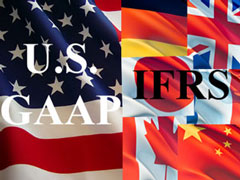 Globalization of financial reporting is becoming a reality with 2015 fast approaching. Those involved in the process of this globalization believe that global financial reporting will improve the functioning of global capital markets by providing more accurate information to investors and other users of these reports. The objective is to come up with one set of standards that will make interpretation of financial reports more uniform and easier to compare the information provided. Many global firms that operate in many countries have a common complaint. It is costly to prepare and audit financial statements using many sets of standards.
Globalization of financial reporting is becoming a reality with 2015 fast approaching. Those involved in the process of this globalization believe that global financial reporting will improve the functioning of global capital markets by providing more accurate information to investors and other users of these reports. The objective is to come up with one set of standards that will make interpretation of financial reports more uniform and easier to compare the information provided. Many global firms that operate in many countries have a common complaint. It is costly to prepare and audit financial statements using many sets of standards.
Many challenges, however, still remain. No change is made without resistance including this convergence from Generally Accepted Accounting Principles to International Financial Reporting Standards. This change is huge in the financial industry. Outside the United States, there is concern that the U.S. will dominate the global market. The International Accounting Standards Board (IASB) and the U.S. Financial Accounting Standards Board (FASB) have been working together to come up with one set of accounting standards. The two boards issued the “Norwalk Agreement” which, in part, stated that the two boards would work together to converge both set of standards into a highly qualified set of global standards. Presently, most major agenda projects are a joint effort. The goal is for the standards issued by the two boards to be identical so as to not leave any room for discrepancies in interpretation. Is the convergence working? Apparently so. Critics at first were skeptical and said the project was doomed for failure for numerous reasons including the political and cultural differences between the FASB and IASB. Both sides have succeeded at a surprisingly faster pace than anticipated. The overall goal of the two organizations is for all major capital markets to be in position for the United States to adopt IFRS by 2015.
Another challenge facing the adoption of IFRS is the need for skilled personnel. Training existing staff and management will be a time consuming process and there will also be a need for personnel with sufficient experience in the application of IFRS to ensure a satisfactory transition.
Information systems and technology raises a concern also. Systems running multiple charts of accounts and consolidation methods will need to be brought in sync with each other. This could be costly. The SEC compiled the results of over 200 comment letters it received in response to the IFRS roadmap. Thirty three percent of the people sighted lack of accounting technical guidance was the main concern along with seven percent concerned about insufficient technology. Is the United States ready for this challenge?

